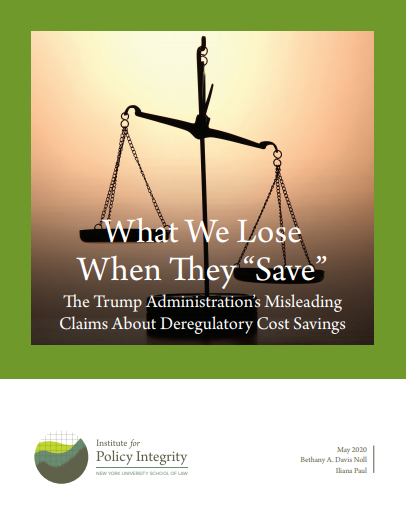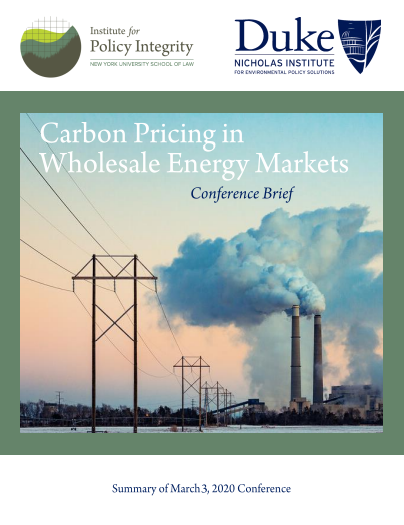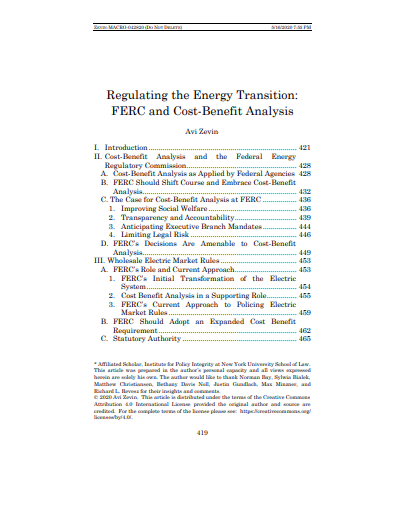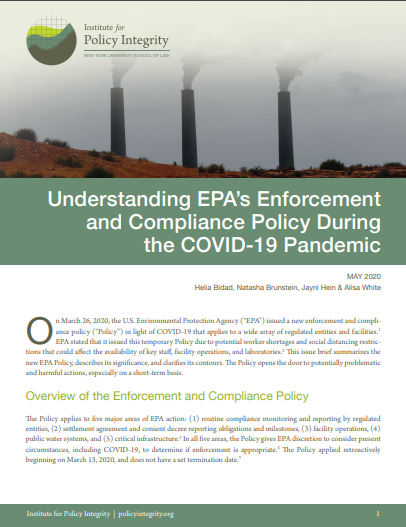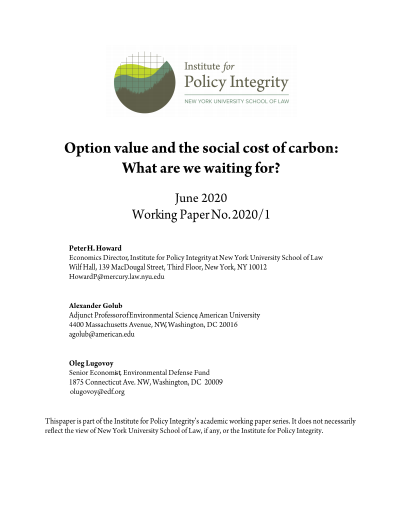-
What We Lose When They “Save”
The Administration’s Misleading Claims About Deregulatory Cost Savings
The Trump administration regularly boasts about the cost savings of rolling back regulations, focusing on industry profits without considering significant negative impacts. This policy brief address and counters the administration's cost savings claims and demonstrates that they should not be taken at face value.
-
Carbon Pricing in Wholesale Energy Markets
Conference Brief
Policy Integrity and the Nicholas Institute for Environmental Policy Solutions at Duke University convened a conference on March 3, 2020, to discuss current, and potential future, approaches to carbon pricing in wholesale markets. This brief highlights some of the major points of discussion and suggests open questions for future study.
-
Regulating the Energy Transition
FERC and Cost-Benefit Analysis
This article, published in the Columbia Journal of Environmental Law, argues that, FERC’s management of this transition would be significantly enhanced if it embraced cost-benefit analysis—including accounting for important indirect costs and benefits such as the effect on climate change—to guide its decisionmaking. Changing course and adopting cost-benefit analysis will allow FERC to manage the energy transition while maximizing social welfare, enhancing transparency and accountability, and mitigating legal and political risk
-
Understanding EPA’s Enforcement and Compliance Policy During the COVID-19 Pandemic
This issue brief summarizes EPA's enforcement and compliance policy in light of COVID-19, describing its significance and clarifying its contours. The policy opens the door to potentially problematic and harmful actions, especially on a short-term basis.
-
Comments to New Jersey BPU on Resource Adequacy Alternatives
The New Jersey Bureau of Public Utilities (BPU) requested public input on its investigation of resource adequacy alternatives. We submitted comments encouraging the New Jersey BPU to recognize important uncertainties affecting the proceeding, consider a broad range of costs of pursuing a Fixed Resource Requirement, and explore the possibility of a carbon pricing program in addition to participation in the Regional Greenhouse Gas Initiative.
-
Option Value and the Social Cost of Carbon
What Are We Waiting For?
Scientists and economists have long recognized that significant uncertainties and irreversibility characterize climate change. And yet, the social cost of carbon (SCC), the preeminent policy tool to address climate change applied by the U.S. government, does not include the option value (OV) that arises due to these characteristics. We demonstrate a simple methodology for approximating the OV underlying the SCC using the Bachelier formula
-
Joint Comments to CFTC on Climate-Related Market Risk
The Commodity Futures Trading Commission (CFTC) requested public input on issues relevant to its Climate-Related Market Risk Subcommittee. We submitted joint comments highlighting the significant financial risks that climate change poses and emphasizing that an economy-wide price on carbon emissions is the regulatory tool that will be the most effective in mitigating a climate-related financial crisis.
-
Comments to PHMSA on Data Collection from Pipeline Accidents
The Pipeline and Hazardous Materials Safety Administration (PHMSA) is proposing to gather additional data on pipeline accidents and fires, including data on injuries, property damage, and loss of natural gas. We submitted comments supporting PHMSA’s efforts to better assess the social cost of accidents and encouraging the agency to estimate greenhouse gas emissions that result from pipeline fires.
-
Comments to SEC on Regulation S-K and Climate Risk
The Securities and Exchange Commission (SEC) proposed a rule modifying Regulation S-K, which governs reporting requirements for public companies. We submitted comments focusing on the SEC’s failure to require disclosure of risks relating to climate change. Climate risks are economy-wide impacts in which the future increasingly diverges from past experience, and predicting such risks requires more granular data than is typically disclosed in financial reporting. We suggest that the SEC adopt a more specific line-item approach to climate risk reporting, similar to the framework suggested under the Task Force on Climate-Related Financial Disclosures.
-
Fourth Circuit Amicus Briefs on Title X Rule
Last year, the Trump administration finalized its Title X “gag rule,” which prohibits funded family planning service providers from referring clients for abortion and requires Title X facilities to be physically separate from facilities that provide abortion. We’ve filed two briefs in the U.S. Court of Appeals for the Fourth Circuit in the ongoing challenge of the rule.

